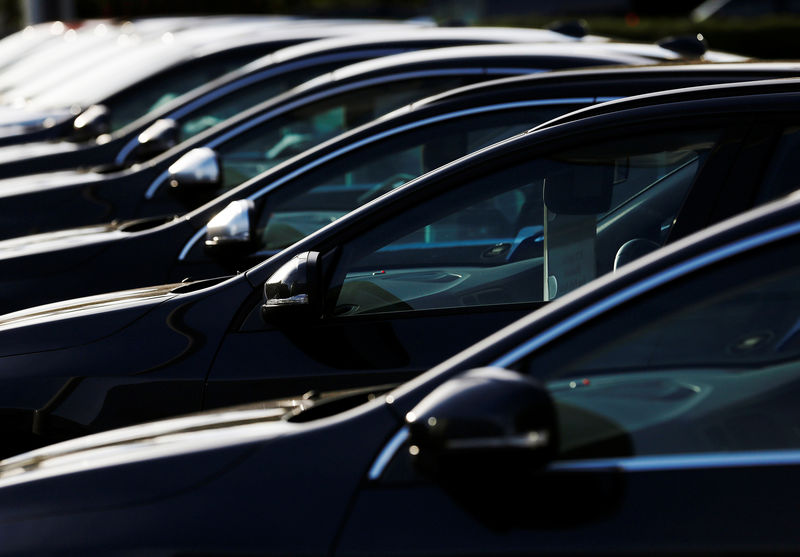 © Reuters. FILE PHOTO – Cars displayed outside a Volvo showroom in west London
© Reuters. FILE PHOTO – Cars displayed outside a Volvo showroom in west LondonBy Costas Pitas
LONDON (Reuters) – British new car sales in 2018 fell at their fastest rate since the global financial crisis a decade ago, hit by the collapse in demand for diesel, as the industry body warned of the existential threat to the sector posed by Brexit.
Registrations dropped 6.8 percent last year to 2.37 million vehicles, the largest fall since sales nosedived 11.3 percent in 2008, according to data from the Society of Motor Manufacturers and Traders (SMMT) showed.
A nearly 30 percent drop in demand for diesel was the most significant factor in the decline. Diesel has been pummelled since the Volkswagen (DE:) emissions cheating scandal of 2015, prompting a crackdown and higher levies.
But the industry also warned that Britain’s departure from the European Union due at the end of March risks the future of a sector which employs over 850,000 people and has been one of Britain’s few manufacturing success stories since the 1980s.
“It’s still hard to see any upside to Brexit,” said SMMT Chief Executive Mike Hawes.
“Everyone recognizes that Brexit is an existential threat to the UK automotive industry and we hope a practical solution will prevail,” he said, calling for lawmakers to back Prime Minister Theresa May’s deal to guarantee a transition period.
Britain, the world’s fifth largest economy, is due to leave the globe’s biggest trading bloc in just over 80 days with May’s agreement looking set to be voted down, leading to a possible no deal Brexit and the imposition of tariffs and customs checks.
Investment looks very likely to have fallen in 2018, the SMMT said, and sales this year are forecast to drop again as the industry body warned a no-deal Brexit would hit jobs.
“You’re not going to see immediate closure of plants but what you could see is a reduction in production volumes and certainly, these are often international companies who have alternatives,” said Hawes.
After record highs in 2015 and 2016, sales fell in 2017 and some analysts see car demand as a leading indicator which could be a harbinger for future economic performance.
Britain’s economy slowed to a crawl at the end of 2018, the housing market is stalling and lending to consumers growing at its slowest pace in nearly four years, according to data released on Friday.
Diesel, which accounted for 48 percent of sales in 2016, fell to 42 percent in 2017 and just 32 percent in 2018, mirroring a trend seen in many European markets.
The rise in petrol sales and drop in diesel means the average CO2 emissions of new cars sold in Britain in 2018 rose just under 3 percent, posing a headache for automakers who need to reduce levels to meet stricter regulations.
New rules which came into force in September also impacted sales by disrupting the supply of some models, the SMMT said.
Demand this year could also be distorted if Britons expect tariffs to be introduced after Brexit, perhaps pushing up registrations in the first three months of 2019.
“The fear of them might encourage some people to purchase in the first quarter,” said Hawes. “The flip side of that is: ‘Well I don’t know what’s going to happen to the economy if you have a no deal so I’ll wait and see’.”
Source: Investing.com



























